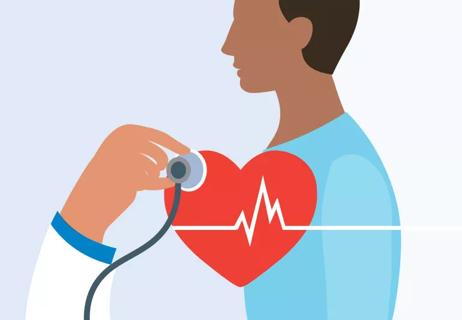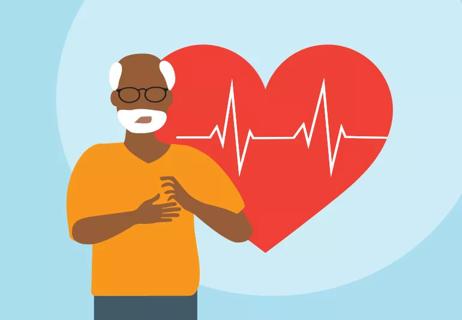If you don’t have other symptoms, try using relaxation techniques and vagal maneuvers to calm your heart down

Most heart palpitations are short-lived, don’t come with other symptoms and can be managed at home.
Advertisement
Cleveland Clinic is a non-profit academic medical center. Advertising on our site helps support our mission. We do not endorse non-Cleveland Clinic products or services. Policy
“If you feel a change in your heartbeat but it doesn’t worry you, it’s OK to try stopping them at home yourself,” says cardiologist Tamanna Singh, MD.
Dr. Singh shares five tried-and-true techniques to get your heart back on beat.
If you want to ease heart palpitations, you need to calm your body and give your heart a chance to catch up.
Many of the most common triggers for palpitations (like caffeine, stress and nicotine) activate your body’s “fight-or-flight” response, also known as your sympathetic nervous system. Basically, your body’s gearing up to defend you against a perceived threat.
You can often reduce heart palpitations by downshifting into a cozy, “rest-and-digest” response. To do that, you need to activate your parasympathetic nervous system.
Here’s how:

Image content: This image is available to view online.
View image online (https://assets.clevelandclinic.org/transform/dd4171a1-1f8d-4a0f-a7ab-998a50c1e595/heart-palpitation-infographic)
“Don’t panic” probably sounds dismissive — but, in this case, it’s also sound medical advice. Feeling anxious about your heartbeat can make palpitations worse. So, let’s say it again: Oftentimes, heart palpitations are nothing to worry about.
“When we fret and stress, we speed up our heart rate and push our body into that ‘fight-or-flight’ response,” Dr. Singh reiterates. “If you’re having palpitations and you tense up — if you let your mind race or focus on the fear — it’s probably going to make the palpitations worse.”
Advertisement
So, take a beat. Then, calmly ask yourself:
If you’re experiencing other symptoms or feel like your heart palpitations aren’t normal, call a provider. Otherwise, try the following methods to reduce them.
Spending a few minutes practicing deep breathing is one of the best ways to calm your mind and, in turn, stop your heart palpitations.
“When we fill up our body with oxygen, it lets our system know that we’re OK. There’s no danger here and we don’t need to be on guard,” Dr. Singh explains.
She suggests the box breathing technique, also called 4x4 breathing. To do it:
You can try for a higher number than four, too, if it feels good. Just be sure to inhale, hold, exhale and hold again for the same amount of time.
If you enjoy this activity, keep it up! Doing breathing exercises for a few minutes at a time several times a day may help prevent anxiety-induced palpitations.
Vagal maneuvers are another way to calm your heart and activate your parasympathetic nervous system. These actions stimulate your vagus nerve, which works as your heart’s natural pacemaker. When it’s activated, it slows down and normalizes your heart’s rhythm, stopping your palpitations.
To ease palpitations, try one (or more) of these actions:
Depending on your health, your provider may recommend trying vagal maneuvers that are more intense, like putting your face in a bowl of cold water, rather than giving it a splash. Always talk to your provider before trying an extreme vagal maneuver for your heart palpitations.
Dehydration and electrolyte imbalances often go hand-in-hand — and when they do, they can cause heart palpitations.
If you haven’t been drinking enough fluids, your best bet is rehydrating yourself with electrolyte-rich beverages like sports drinks. You can also buy sugar-free electrolyte powders or tablets that dissolve in water.
Don’t have those options on hand? Drink water. If you can, add a small pinch of salt for an electrolyte boost.
Advertisement
If you’re having heart palpitations, ask yourself what (if anything) could be triggering them. Having too much caffeine, nicotine, alcohol (or even spicy food!) can all kick your fight-or-flight mode into high gear and trigger palpitations.
Setting down that cup of coffee or skipping that second helping of extra-spicy chicken vindaloo won’t be an instant fix. But it should eventually calm the palpitations — or at least keep them from getting worse.
Not sure what your triggers are? If you get palpitations often, Dr. Singh suggests keeping a symptom diary. By writing down when they happen and what you’re doing, you may be able to home in on your triggers.
“It’s a great way to keep track of patterns,” she says. “Note the intensity of the feeling, how long they last and so on. That way, you can provide your specialist with a detailed description about what’s going on.”
It’s important to contact a healthcare provider if you’re getting heart palpitations more often than you used to — or if heart palpitations aren’t your only symptom. These could both indicate an underlying condition.
Call 911 or emergency services immediately if you’re:
Advertisement
“Always trust your gut,” Dr. Singh advises. “You can treat occasional, mild palpitations at home. But if you’re worried that something dangerous is happening, call 911.”
Advertisement

Sign up for our Health Essentials emails for expert guidance on nutrition, fitness, sleep, skin care and more.
Learn more about our editorial process.
Advertisement

Eating heart-healthy foods, moving around more and getting quality sleep are a few ways to get started

Chronic stress can trigger palpitations, inflammation, angina and other serious heart issues

Yes — and depending on the level of dehydration, you may need emergency care

Research shows a strong association between rheumatoid arthritis and heart issues

Knowing what you can do to prevent or manage heart disease is half the battle

A skipped heartbeat is usually your heart returning to its normal electrical path

Don’t self-medicate with vitamin supplements without consulting a doctor first

Too little magnesium can make your heartbeat go off beat

Even small moments of time outdoors can help reduce stress, boost mood and restore a sense of calm

A correct prescription helps your eyes see clearly — but as natural changes occur, you may need stronger or different eyeglasses

Both are medical emergencies, but they are very distinct events with different causes